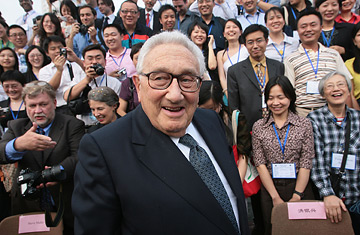
Former U.S. Secretary of State Henry Kissinger arrives at Nanjing University on June 23, 2007.
Hengli Jixinge looks just like Henry Kissinger — except, this being China, everyone adores him. Jixinge (pronounced Gee-Sing-Guh) is the way the former Secretary of State's name is said in Mandarin. And while Kissinger may nowadays get blank stares in the U.S. and other parts of the world, here in Nanjing, where he was giving a speech in late June, practically everyone had heard of him. Almost the entire sample of people I spoke to before the event, from a PR firm manager to a factory electrician, knew who Jixinge was.
More importantly, everyone loves him. From the moment he landed in Nanjing, a fawning press covered his every move, marveling repeatedly at how spry he remains at age 84. When Kissinger lands elsewhere, he has to worry he'll be summoned to testify about knowledge of war crimes — several years back he cut short a trip to France rather than answer a court summons; he had the Brazilian government revoke an invitation because it couldn't guarantee his immunity; and saw a suit filed against him at home, in a Washington, D.C. federal court). During the event at Nanjing University, Jixinge worked the enthusiastic crowd, grasping outstretched hands as if he were Bono; on American campuses, students have turned their backs in protest. No wonder he enjoys coming to China so much: He's visited more than 50 times since his first secret trip in 1971, when he and Zhou Enlai arranged the following year's historic Nixon-Mao summit.
For the event at the Hopkins-Nanjing Center, an educational joint venture of the university with Johns Hopkins, the local papers put Hengli on the front page — the Modern Express even switching into English with a headline reading "Welcome". Why is Kissinger not simply welcome in China, but treated like a celebrity? Kissinger is naturally credited for contributions toward renewing US-China ties, and his personal relationships with Mao and Zhou mark him with greatness by association. Add to this the Chinese worship of academic achievement. The year I studied at the Hopkins-Nanjing Center, I was shocked by reaction to a lecture by a Nobel Prize-winning economist; the overflow crowd stampeded the podium afterwards, jostling for photos and autographs. When Steven Hawking appeared at Beijing's Great Hall of the People last summer, crazed fans rushed the stage. I know young women who get weak-kneed at the mention of Albert Einstein.
Kissinger's reputation as brilliant scholar helps explain his Confucian sex appeal. However, when it comes to American political figures of Kissinger's stature, public image ultimately depends on the propaganda apparatus; the fact that Kissinger is identified as an "old friend" of China is related to the backing the country's political elites have given him over the years. And undoubtedly, key to this backing have been Kissinger's activities here since leaving office.
When Kissinger dropped the line in his speech about his fifty-plus visits to China, the crowd issued a murmur of awe, as if to say, "what commitment to our country!" And yet, as the audience should have known, most of these visits were just business; Kissinger Associates, the firm he founded after leaving office, has helped a long list of multinationals enter China. Anthony J. F. O'Reilly, the ex-head of Heinz, a top baby food seller here, explained how Kissinger is especially valued in countries "where the principal players and the dynamics among the principal players are of critical importance. This is particularly true in China, where he is a popular figure and is viewed with particular respect."
Even beyond this role arranging what must have been lucrative deals for China's "principal players," there's a deeper reason Kissinger enjoys such support from the leadership: he seems to agree with them on the paramount importance of stability. As the author Robert D. Kaplan has suggested, for Kissinger "the key word is 'revolution,' something that [his] experience as a youth [in Nazi Germany], augmented by scholarship, taught him to fear." Deng Xiaoping cleared Tiananmen Square by force in 1989 in part because of vivid memories of the luan, or chaos, caused by rampaging Red Guards; Nazi Brown Shirts would have made a similar impression on Kissinger. Given this context, it's easier to comprehend the striking degree of empathy Kissinger displayed following the Tiananmen crackdown. "No government in the world would have tolerated having the main square of its capital occupied for eight weeks by tens of thousands of demonstrators," he noted — and then counseled everyone return to business.
In Nanjing Kissinger received an award for "Outstanding Contributions to Cultural Understanding" between China and America. For his role in the 1970s, certainly. As for his relations with Beijing in the years since, however, there may be a little bit too much mutual understanding going on. In any case, Hengli can rest assured: should more suits be filed against him in America, he's always welcome in China.
